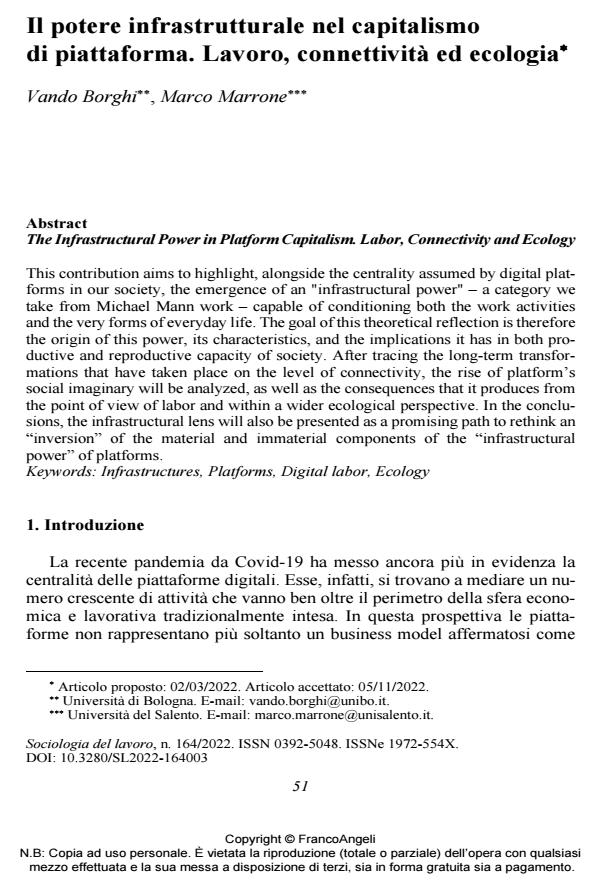Il potere infrastrutturale nel capitalismo di piattaforma. Lavoro, connettività ed ecologia
Titolo Rivista SOCIOLOGIA DEL LAVORO
Autori/Curatori Vando Borghi, Marco Marrone
Anno di pubblicazione 2022 Fascicolo 2022/164
Lingua Italiano Numero pagine 19 P. 51-69 Dimensione file 225 KB
DOI 10.3280/SL2022-164003
Il DOI è il codice a barre della proprietà intellettuale: per saperne di più
clicca qui
Qui sotto puoi vedere in anteprima la prima pagina di questo articolo.
Se questo articolo ti interessa, lo puoi acquistare (e scaricare in formato pdf) seguendo le facili indicazioni per acquistare il download credit. Acquista Download Credits per scaricare questo Articolo in formato PDF

FrancoAngeli è membro della Publishers International Linking Association, Inc (PILA), associazione indipendente e non profit per facilitare (attraverso i servizi tecnologici implementati da CrossRef.org) l’accesso degli studiosi ai contenuti digitali nelle pubblicazioni professionali e scientifiche.
Questo contributo vuole mettere in evidenza, accanto alla centralità assunta dalle piattaforme digitali nella nostra società, l’emergere di un "potere infrastrutturale" - categoria che prendiamo in prestito dal lavoro di Michael Mann - in grado di con-dizionare tanto le attività lavorative, quanto le stesse forme della vita quotidiana. L’oggetto della riflessione è l’origine di tale potere, le sue caratteristiche e le sue implicazioni nei confronti della capacità produttiva e riproduttiva della società. Dopo aver ripercorso le trasformazioni avvenute sul piano della connettività, verrà dunque analizzata l’ascesa delle piattaforme e le conseguenze tanto nell’ottica specifica del lavoro, quanto all’interno di una più ampia prospettiva ecologica. Nelle conclusioni, la lente infrastrutturale verrà presentata anche come pista pro-mettente attraverso cui ripensare un "inversione" delle componenti materiali e immateriali che determinano il "potere infrastrutturale" delle piattaforme.
Parole chiave:infrastrutture, piattaforme, lavoro digitale, ecologia
- Da landlocked a landlinked alle proprie condizioni: connettività e megaprogetti in Turkmenistan Matteo Fumagalli, in ASIAC – Studies on Central Asia and the Caucasus (SCC) /2025 pp.21
DOI: 10.36253/asiac-3578 - Esperienza operaia dell'ecologia e ambientalismo del lavoro all'Italsider/Ilva di Taranto. Dagli anni Cinquanta al 2018 Emanuele Leonardi, in SOCIOLOGIA DEL LAVORO 165/2023 pp.155
DOI: 10.3280/SL2023-165008 - Diversity and Inclusion in Italy Attila Bruni, pp.663 (ISBN:978-3-031-81937-7)
Vando Borghi, Marco Marrone, Il potere infrastrutturale nel capitalismo di piattaforma. Lavoro, connettività ed ecologia in "SOCIOLOGIA DEL LAVORO " 164/2022, pp 51-69, DOI: 10.3280/SL2022-164003